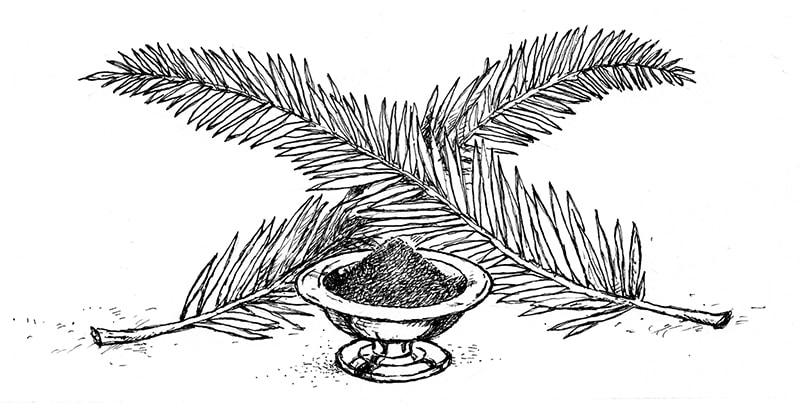Ash Wednesday – Soot up for Lent
Now, that we have the background about the name and timing of Lent in place, let’s look at the first day of Lent: Ash Wednesday. Ash Wednesday marks the beginning of the Church’s season of Lent -- a 40-day season of fasting, repentance and prayer. On Ash Wednesday, the faithful present themselves to receive ashes. At Masses that day, following the homily, ashes are blessed and then applied to faithful in the form of a cross on their foreheads. These ashes are derived from burning the blessed palm branches used on Palm Sunday during the previous year.
It should be noted that while Ash Wednesday is not a solemnity (high holy day) or a Holy Day of Obligation (mandatory Mass attendance day), nonetheless, more people go to Church on Ash Wednesday than any other day of the year, except for Christmas. Why is this? Because even a somewhat lapsed Catholic has -- in his hard-wiring -- the need to repent, and the desire set his life right with God and His holy Church. Ash Wednesday presents that opportunity; it is like the opening ceremony of the redemption Olympics.
I should also mention a little history about the name and origins of Ash Wednesday: The name Ash Wednesday finds it roots in the Latin term "Dies Cinerum" (found in the Latin text of the Roman Missal used at Mass) – that term means, literally, “Day of Ashes” or “Day of Cinders.” It is asserted that this practice of receiving Ashes was begun some 15 centuries ago by Pope Gregory the Great in the 6th century.
It should be noted that while Ash Wednesday is not a solemnity (high holy day) or a Holy Day of Obligation (mandatory Mass attendance day), nonetheless, more people go to Church on Ash Wednesday than any other day of the year, except for Christmas. Why is this? Because even a somewhat lapsed Catholic has -- in his hard-wiring -- the need to repent, and the desire set his life right with God and His holy Church. Ash Wednesday presents that opportunity; it is like the opening ceremony of the redemption Olympics.
I should also mention a little history about the name and origins of Ash Wednesday: The name Ash Wednesday finds it roots in the Latin term "Dies Cinerum" (found in the Latin text of the Roman Missal used at Mass) – that term means, literally, “Day of Ashes” or “Day of Cinders.” It is asserted that this practice of receiving Ashes was begun some 15 centuries ago by Pope Gregory the Great in the 6th century.

